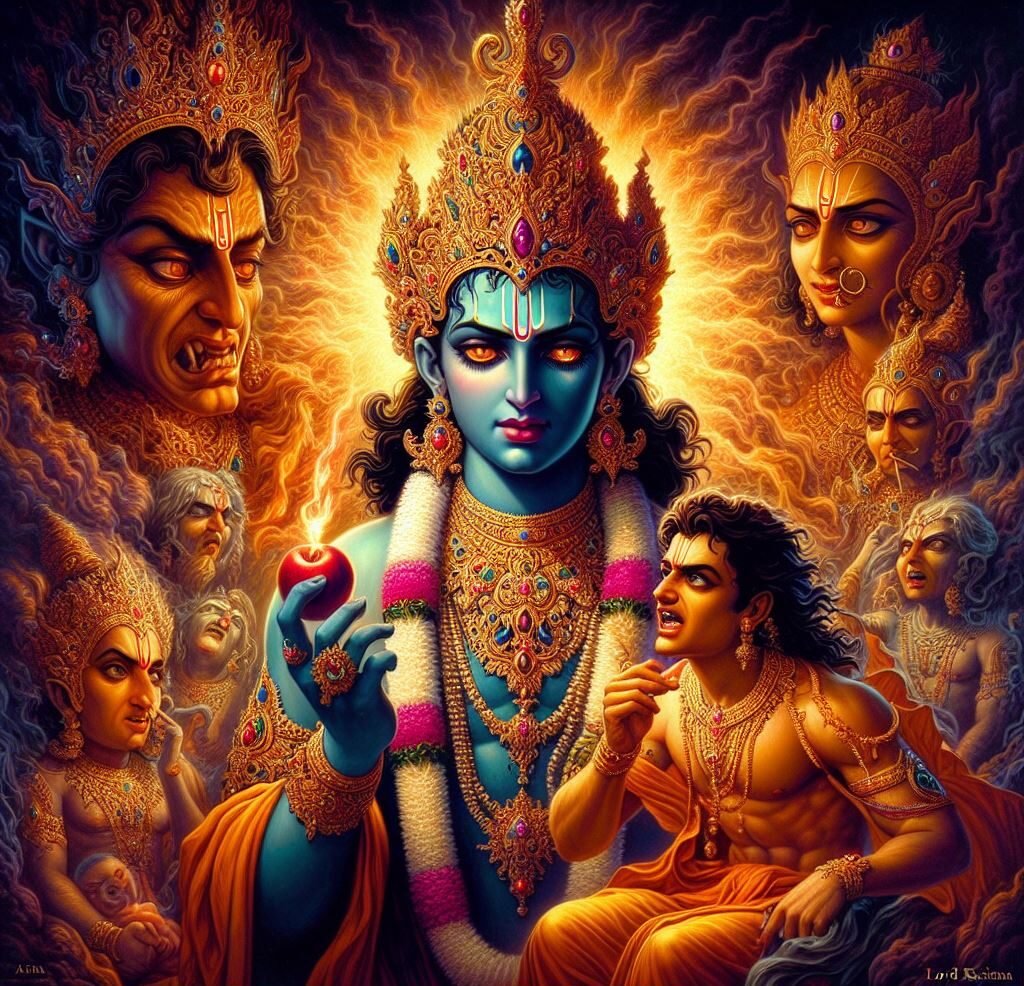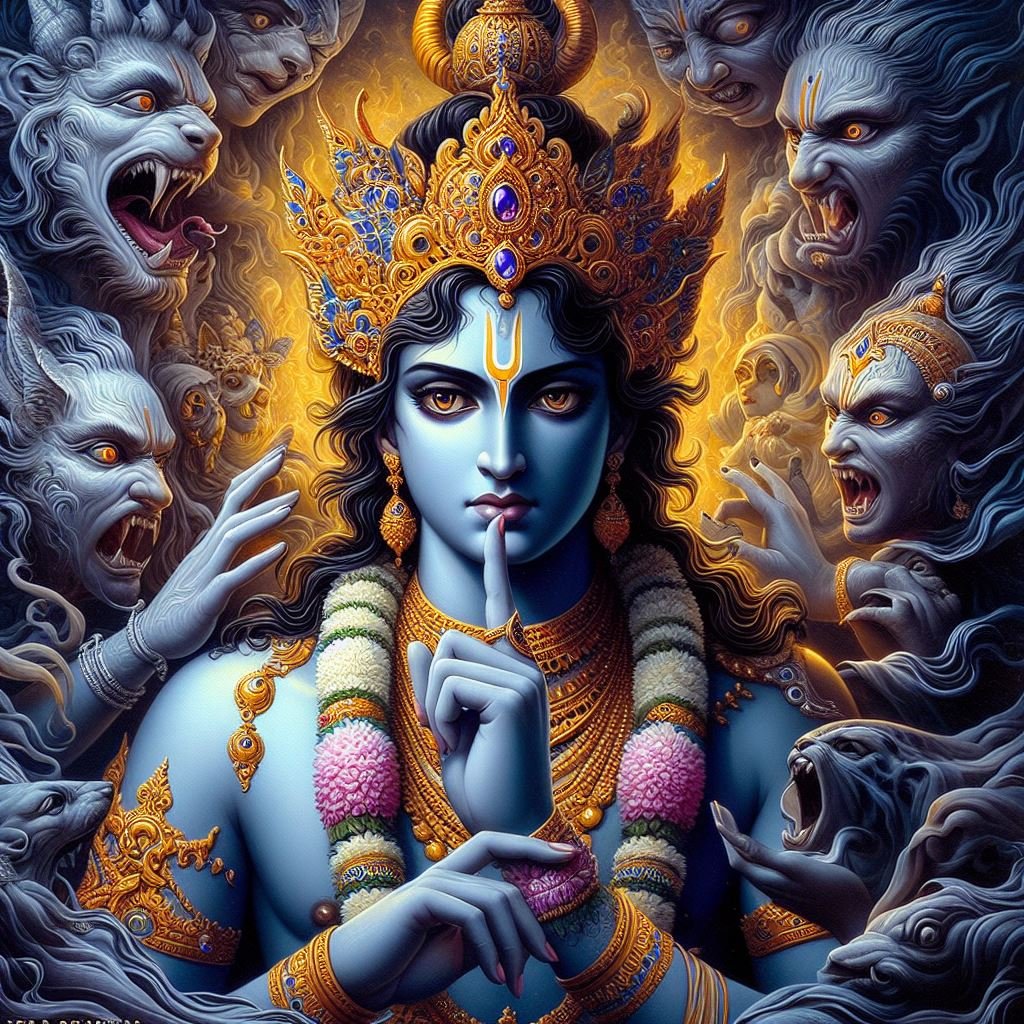The Supreme Lord elucidated: “Understand that it is lust, emerging from the interaction with the mode of passion, that subsequently evolves into anger. Recognize it as the sinful, voracious adversary in the world.”
Description
The term “lust” in the Vedas encompasses not only sexual desires but also all cravings for material enjoyment rooted in the bodily conception of the self. It manifests in various forms such as the pursuit of wealth, physical pleasures, social status, or power. This distorted desire stems from the soul’s innate love for God, which becomes perverted when associated with the material energy and the mode of passion.

Shree Krishna identifies this worldly craving as the source of sin, the insidious force lurking within us. The mode of passion deceives the soul into believing that material objects can provide satisfaction, leading to the creation of desires for their acquisition. Satisfying these desires breeds greed, while frustration leads to anger. All three—lust, greed, and anger—drive individuals to commit sinful acts. Greed is merely an intensified form of desire, while anger arises from unfulfilled desires. Hence, Shree Krishna asserts that lust, or desire, serves as the foundation of all evil.

सर्वोच्च भगवान ने स्पष्ट किया: “समझें कि यह वासना है, जो रजोगुण के संपर्क से उत्पन्न होती है, जो बाद में क्रोध में विकसित होती है। इसे दुनिया में पापी, भयानक शत्रु के रूप में पहचानें।”
विवरण
वेदों में “वासना” शब्द में न केवल यौन इच्छाएं शामिल हैं, बल्कि स्वयं की शारीरिक अवधारणा में निहित भौतिक आनंद की सभी लालसाएं भी शामिल हैं। यह विभिन्न रूपों में प्रकट होता है जैसे धन, भौतिक सुख, सामाजिक स्थिति या शक्ति की खोज। यह विकृत इच्छा ईश्वर के प्रति आत्मा के सहज प्रेम से उत्पन्न होती है, जो भौतिक ऊर्जा और रजोगुण से जुड़कर विकृत हो जाती है।
श्री कृष्ण इस सांसारिक लालसा को पाप के स्रोत, हमारे भीतर छिपी कपटी शक्ति के रूप में पहचानते हैं। जुनून की अवस्था आत्मा को यह विश्वास दिलाती है कि भौतिक वस्तुएँ संतुष्टि प्रदान कर सकती हैं, जिससे उनकी प्राप्ति के लिए इच्छाएँ पैदा होती हैं। इन इच्छाओं को संतुष्ट करने से लालच पैदा होता है, जबकि निराशा से गुस्सा पैदा होता है। तीनों – वासना, लालच और क्रोध – व्यक्तियों को पापपूर्ण कार्य करने के लिए प्रेरित करते हैं। लालच इच्छा का ही तीव्र रूप है, जबकि क्रोध अधूरी इच्छाओं से उत्पन्न होता है। इसलिए, श्री कृष्ण कहते हैं कि वासना, या इच्छा, सभी बुराइयों की नींव के रूप में कार्य करती है।
ସର୍ବୋପରି ପ୍ରଭୁ ସ୍ପଷ୍ଟ କରିଛନ୍ତି: “ବୁ stand ନ୍ତୁ ଯେ ଏହା ଲୋଭ ଅଟେ, ଉତ୍ସାହର ଧାରା ସହିତ ପାରସ୍ପରିକ କ୍ରିୟା ଦ୍ ing ାରା ଉତ୍ପନ୍ନ ହୁଏ, ଯାହା ପରବର୍ତ୍ତୀ ସମୟରେ କ୍ରୋଧରେ ପରିଣତ ହୁଏ। ଏହାକୁ ବିଶ୍ world ର ପାପପୂର୍ଣ୍ଣ, ଘୋର ଶତ୍ରୁ ଭାବରେ ସ୍ୱୀକାର କର।”
ବର୍ଣ୍ଣନା
ବେଦରେ “ଲୋଭ” ଶବ୍ଦ କେବଳ ଯ sexual ନ ଇଚ୍ଛାକୁ ନୁହେଁ ବରଂ ଆତ୍ମର ଶାରୀରିକ ଧାରଣାରେ ମୂଳତ material ବସ୍ତୁ ଉପଭୋଗ ପାଇଁ ସମସ୍ତ ଇଚ୍ଛାକୁ ମଧ୍ୟ ଅନ୍ତର୍ଭୁକ୍ତ କରେ | ଏହା ବିଭିନ୍ନ ରୂପରେ ଦେଖାଯାଏ ଯେପରିକି ଧନ, ଶାରୀରିକ ଭୋଗ, ସାମାଜିକ ସ୍ଥିତି, କିମ୍ବା ଶକ୍ତି | ଏହି ବିକୃତ ଇଚ୍ଛା ଭଗବାନଙ୍କ ପ୍ରତି ଆତ୍ମାର ଅନ୍ତର୍ନିହିତ ପ୍ରେମରୁ ଉତ୍ପନ୍ନ ହୁଏ, ଯାହା ବସ୍ତୁ ଶକ୍ତି ଏବଂ ଉତ୍ସାହର ଧାରା ସହିତ ଜଡିତ ହେଲେ ବିକୃତ ହୋଇଯାଏ |

ଶ୍ରୀ କୃଷ୍ଣ ଏହି ସାଂସାରିକ ଲୋଭକୁ ପାପର ଉତ୍ସ, ଆମ ଭିତରେ ଲୁଚି ରହିଥିବା ଗୁପ୍ତ ଶକ୍ତି ଭାବରେ ଚିହ୍ନଟ କରନ୍ତି | ଉତ୍ସାହର ଧାରା ଆତ୍ମାକୁ ବିଶ୍ୱାସ କରେ ଯେ ବସ୍ତୁ ବସ୍ତୁଗୁଡ଼ିକ ତୃପ୍ତି ପ୍ରଦାନ କରିପାରିବ, ଯାହା ସେମାନଙ୍କର ଅଧିଗ୍ରହଣ ପାଇଁ ଇଚ୍ଛା ସୃଷ୍ଟି କରେ | ଏହି ଇଚ୍ଛା ପୂରଣ କରିବା ଲୋଭ ସୃଷ୍ଟି କରେ, ଯେତେବେଳେ ନିରାଶା କ୍ରୋଧକୁ ନେଇଥାଏ | ସମସ୍ତ ତିନୋଟି – ଲୋଭ, ଲୋଭ ଏବଂ କ୍ରୋଧ – ବ୍ୟକ୍ତିମାନଙ୍କୁ ପାପପୂର୍ଣ୍ଣ କାର୍ଯ୍ୟ କରିବାକୁ ପ୍ରେରିତ କରେ | ଲୋଭ କେବଳ ଇଚ୍ଛାର ଏକ ତୀବ୍ର ରୂପ, ଯେତେବେଳେ ଅସନ୍ତୁଷ୍ଟ ଇଚ୍ଛାରୁ କ୍ରୋଧ ଉତ୍ପନ୍ନ ହୁଏ | ତେଣୁ, ଶ୍ରୀକୃଷ୍ଣ କହିଛନ୍ତି ଯେ ଲୋଭ ବା ଇଚ୍ଛା ସମସ୍ତ ମନ୍ଦତାର ମୂଳଦୁଆ ଅଟେ।